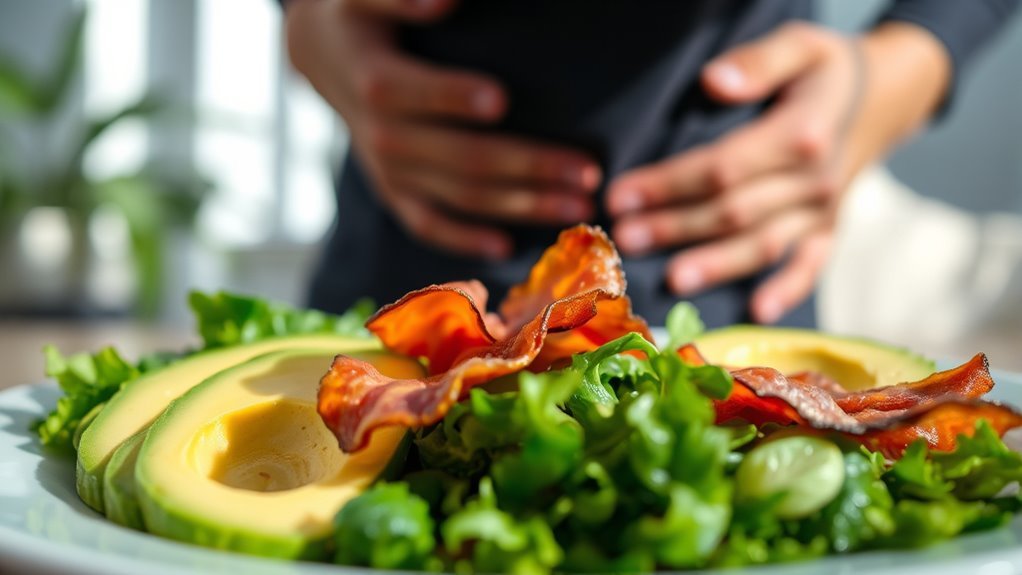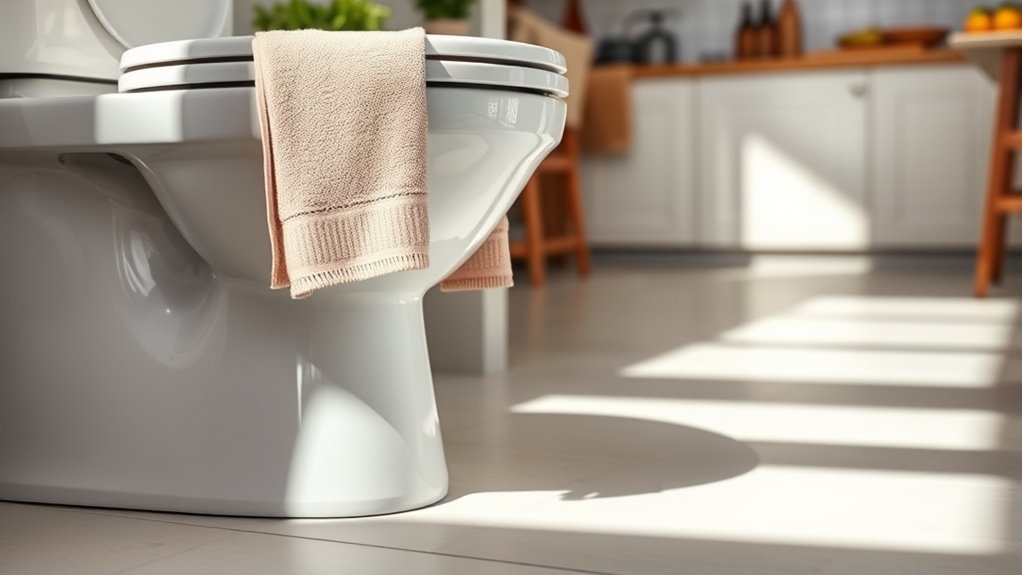Yes, the keto diet can cause diarrhea, especially during the initial adaptation phase. This is often due to reduced fiber intake from restricted carbohydrates and high fat consumption, which can lead to malabsorption. Additionally, reactions to sugar alcohols or dairy in keto-friendly foods may trigger digestive issues. To alleviate symptoms, maintaining hydration and balancing electrolytes is essential. If diarrhea persists, it’s important to evaluate further options to guarantee a smoother shift and optimize your keto experience.
Understanding the Keto Diet

When you’re exploring the keto diet, it’s vital to understand its fundamental principles. The keto basics revolve around drastically reducing carbohydrate intake while increasing fats, which shifts your body into a state of ketosis. In this metabolic state, your body burns fat for energy instead of glucose. Achieving the right macronutrient balance is paramount; typically, your diet should consist of about 70-75% fats, 20-25% protein, and only 5-10% carbohydrates. This balance not only promotes weight loss but also enhances mental clarity and energy levels. It’s critical to choose healthy fats like avocados and olive oil while avoiding processed options. Understanding these principles empowers you to make informed dietary choices and embrace the freedom that comes with the keto lifestyle.
Common Side Effects of the Keto Diet

When starting the keto diet, you might experience several common side effects, including digestive changes and electrolyte imbalances. It’s vital to understand how these issues can affect your overall health and why maintaining adequate fiber intake is essential. By recognizing these potential challenges, you can better navigate your keto journey.
Digestive Changes Explained
Although the keto diet can be effective for weight loss and metabolic health, many individuals experience digestive changes as their bodies adjust to a low-carbohydrate, high-fat regimen. One common issue is an imbalance in gut bacteria, which can occur when dietary fiber decreases considerably. This shift may lead to discomfort, bloating, or diarrhea as the body works to adapt. Additionally, the production of digestive enzymes may be affected, as your body may not be accustomed to breaking down higher amounts of fat. To support your digestive health, consider gradually introducing healthy fats and ensuring you maintain some fiber intake. Monitoring these changes can help you regain your bacterial balance and improve overall digestion while enjoying the freedom the keto diet offers.
Electrolyte Imbalance Effects
As your body adapts to the keto diet, you may encounter various side effects, including electrolyte imbalances. These imbalances often stem from reduced carbohydrate intake, which can lead to lower insulin levels and increased sodium excretion. You might experience symptoms like fatigue, muscle cramps, or headaches. To combat these effects, it’s vital to focus on adequate electrolyte sources—such as potassium-rich avocados, magnesium from nuts, and sodium from broth. Additionally, implementing effective hydration strategies is essential; drinking plenty of water can help maintain balance. If you feel symptoms persisting, consider consulting a healthcare professional. Staying informed and proactive can support your journey towards the freedom of a keto lifestyle while minimizing discomfort.
Fiber Intake Importance
One essential aspect of the keto diet that often gets overlooked is fiber intake. While you’re cutting carbs, it’s important to include adequate fiber sources to maintain digestive health. High-fiber foods like leafy greens, avocados, and nuts can help prevent constipation and diarrhea, common side effects of the diet. If you struggle to get enough fiber from food, consider fiber supplements as a practical solution. These can help you meet your daily fiber goals without adding excessive carbohydrates. Remember, fiber plays a significant role in gut health and can mitigate some digestive issues associated with keto. By being mindful of your fiber intake, you can enjoy the freedom of a keto lifestyle while minimizing uncomfortable side effects.
The Link Between Keto and Diarrhea

When shifting to a ketogenic diet, many people experience gastrointestinal issues, including diarrhea. This can often be attributed to your body undergoing keto adaptations, where it adjusts to burning fat for fuel instead of carbohydrates. During this change, your digestive health may temporarily suffer as your gut microbiome adapts to a new nutrient profile.
| Factor | Impact on Digestion |
|---|---|
| Low Carb Intake | Reduced fiber consumption |
| High Fat Consumption | Potential for malabsorption |
| Electrolyte Changes | Increased bowel movements |
Maintaining a balance of electrolytes and incorporating suitable fats can help mitigate these symptoms. Understanding this link can empower you to navigate your keto journey more effectively.
Causes of Diarrhea on a Keto Diet
When you’re on a keto diet, several factors can contribute to diarrhea. Changes in dietary fiber intake, the fat adaptation process, and potential electrolyte imbalances may all play significant roles. Understanding these causes can help you address and manage gastrointestinal issues effectively.
Dietary Fiber Changes
Although the ketogenic diet is praised for its weight loss benefits, many people experience digestive issues, including diarrhea, largely due to significant changes in dietary fiber intake. On a keto diet, traditional fiber sources like whole grains and fruits are often restricted, leading to lower fiber consumption. This sudden reduction can disrupt your digestive system, resulting in diarrhea. Without sufficient fiber, your gut may struggle to maintain regularity. To counter this, consider incorporating fiber supplements, which can help bridge the gap and support digestive health. Look for soluble fiber options, like psyllium husk, to ease the shift. By managing your fiber intake thoughtfully, you can enjoy the benefits of the keto diet while minimizing digestive discomfort.
Fat Adaptation Process
As your body changes into a state of ketosis, the fat adaptation process can lead to gastrointestinal disturbances, including diarrhea. During this metabolic shift, your gut may struggle to adjust to the increased fat intake, which can disrupt digestion.
| Cause of Diarrhea | Emotion Evoked |
|---|---|
| Increased fat intake | Frustration |
| Rapid metabolic changes | Confusion |
| Altered gut microbiome | Anxiety |
| Dehydration | Fear |
| Electrolyte changes | Discomfort |
These factors can contribute to loose stools, making it essential to listen to your body and adjust your diet accordingly. Embracing the freedom of a keto lifestyle doesn’t have to mean enduring digestive distress.
Electrolyte Imbalance Issues
Electrolyte imbalances can considerably impact your digestive health, especially on a keto diet. When you drastically reduce carbohydrate intake, your body excretes more sodium, leading to low sodium levels. This can disrupt your overall electrolyte balance and contribute to diarrhea. To mitigate these effects, it’s vital to implement effective hydration strategies. Consider increasing your sodium intake through broth or electrolyte supplements to maintain proper levels. Staying hydrated with water and electrolyte-rich beverages can also support your digestive function. Remember, balancing electrolytes is essential for overall health and can help you avoid gastrointestinal distress. By addressing these imbalances, you can enjoy the benefits of a keto diet while minimizing discomfort.
Dietary Changes That May Trigger Digestive Issues
When you make significant changes to your diet, especially with a low-carb approach like the keto diet, it’s common to experience digestive issues, including diarrhea. These dietary adjustments can affect your gut health as your body adapts to a new source of fuel. Lower fiber intake, typical in keto, can disrupt regular bowel movements. Additionally, a sudden increase in fats can be challenging for your digestive system, leading to discomfort and loose stools. Some individuals may also react to sugar alcohols or dairy, both common in keto foods. It’s essential to listen to your body and monitor how these changes impact your digestive health, ensuring you maintain the freedom to enjoy your meals without unwanted side effects.
How to Mitigate Diarrhea on Keto
Adapting to the keto diet can lead to digestive challenges, including diarrhea, but there are strategies to help manage these symptoms effectively. Incorporating probiotic foods like yogurt, kefir, and sauerkraut can support gut health by introducing beneficial bacteria. Additionally, focus on hydration strategies; maintaining adequate fluid intake is essential, as the keto diet can lead to increased water loss. Electrolyte-rich drinks can also help balance your body’s minerals. Gradually shifting into the diet gives your digestive system time to adjust, reducing the risk of diarrhea. Finally, monitor your fiber intake, ensuring it comes from low-carb sources to avoid gastrointestinal discomfort. By implementing these practices, you can enjoy the freedom of a keto lifestyle while minimizing digestive issues.
When to Consult a Healthcare Professional
While many people experience mild digestive issues when starting a keto diet, there are times when it’s important to consult a healthcare professional. If you’re experiencing persistent diarrhea symptoms that last more than a few days, it’s vital to seek help. Dehydration and nutrient deficiencies can arise from prolonged diarrhea, impacting your overall health. Additionally, if you notice blood in your stool, severe abdominal pain, or signs of dehydration—like dizziness or reduced urination—don’t hesitate to reach out to a healthcare provider. They can assess your symptoms and guide you on whether your keto approach needs adjustment or if there’s an underlying condition requiring attention. Prioritizing your health guarantees you enjoy the benefits of a keto lifestyle safely.
Tips for a Successful Keto Experience
To guarantee a successful keto experience, it’s vital to plan your meals thoughtfully and prioritize nutrient-dense foods. Start by incorporating healthy fats, such as avocados and olive oil, while minimizing carbs. Meal planning can help you stay on track and avoid high-carb temptations. Consider prepping meals for the week ahead to simplify your choices.
Don’t forget about snack ideas; options like nuts, cheese, and low-carb veggies can keep you satisfied between meals. Staying hydrated and replenishing electrolytes is also essential to prevent keto flu symptoms. Finally, listen to your body and adjust your intake based on how you feel. With careful planning and mindful eating, you can enjoy the freedom and benefits of the keto lifestyle.
Frequently Asked Questions about Keto Diet and Diarrhea
1. Can a keto diet cause diarrhea?
Yes, the keto diet can cause diarrhea in some individuals. This is often due to a sudden increase in fat intake, which can lead to digestive issues. Many people also experience changes in their gut microbiome as they eliminate carbohydrates, which can further contribute to gastrointestinal discomfort.
2. What are the common causes of diarrhea on a keto diet?
Common causes of diarrhea on a keto diet include increased fat consumption, food intolerances (such as dairy), and the consumption of sugar alcohols found in many keto-friendly products. The body may take time to adjust to a higher fat intake, leading to temporary digestive issues.
3. How can I prevent diarrhea while on a keto diet?
To prevent diarrhea, gradually increase your fat intake to allow your digestive system to adjust. Stay hydrated, monitor your intake of fiber, and consider reducing or eliminating foods that may trigger gastrointestinal issues, such as dairy or sugar alcohols. Incorporating probiotics may also help in maintaining gut health.
4. Is diarrhea a sign that the keto diet is not working?
Not necessarily. Diarrhea can be a temporary side effect as your body adjusts to the dietary changes. However, if it persists for an extended period or is accompanied by other symptoms such as severe abdominal pain or dehydration, it may be a sign that the diet is not suitable for you, and consulting a healthcare professional is recommended.
5. When should I see a doctor about my diarrhea on a keto diet?
You should see a doctor if diarrhea lasts more than a few days, is severe, or is accompanied by symptoms such as fever, dehydration, or blood in the stool. It’s important to address any potential underlying issues and ensure that the keto diet is appropriate for your health needs.
References
- https://www.ncbi.nlm.nih.gov/pmc/articles/PMC6520887/
- https://www.healthline.com/nutrition/keto-diet-side-effects
- https://www.mayoclinic.org/healthy-lifestyle/nutrition-and-healthy-eating/expert-answers/keto-diet/faq-20447283
- https://www.webmd.com/diet/what-to-know-about-keto-diet
- https://www.cdc.gov/nutrition/resources-publications/what-is-the-ketogenic-diet.html
- https://www.hopkinsmedicine.org/health/wellness-and-prevention/what-is-the-keto-diet
- https://www.frontiersin.org/articles/10.3389/fnut.2020.00033/full


